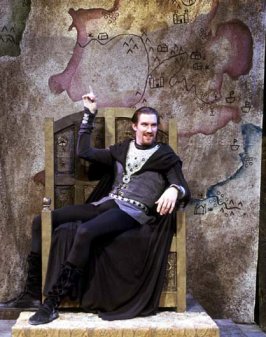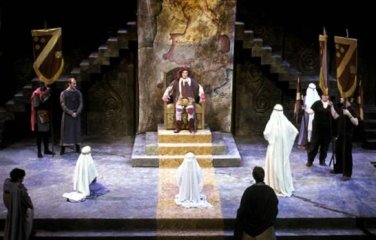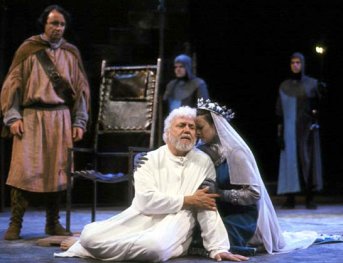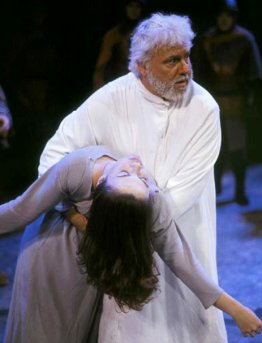Summary 
Insightful outdoor production with a heavyset and ailing Lear portrayed as a fading tyrant, still imposing but lacking in sympathy. Interestingly strong focus on Edgar, falling with Lear as ineffectual and resorting to feigned madness but rising in nobility to return as a dignified champion, and on Oswald, an omnipresent sycophant and bit-player much like Edmund in miniature.
Design
Directed by Calvin MacLean. Set by John Stark. Costumes by Dan Wilhelm. Lights by Andrew Catron. Sound by Roderick Peeples.
Cast
Roderick Peeples (Lear), Rebecca MacLean (Goneril), Greg McGrath (Albany), Laura Ames (Regan), Frank Nall (Cornwall), Corrie Danieley (Cordelia), Tom Quinn (Kent), Jack McLaughlin-Gray (Gloucester), Rian Jairell (Edgar), Nathan Hosner (Edmund), Henson Keys (Fool), Michael DiPadova (Oswald).
Analysis
Calvin MacLean, artistic director of the Illinois Shakespeare Festival, begins the outdoor Festival's season with an insightful King Lear. A gold carpet leads up three steps to a throne at center stage. A banner map of England hangs from the balcony to billow in the evening breeze over Lear's throne. A deep crack cuts diagonally across the stage floor, splitting the stage right wall and the steps leading to the balcony.
The production begins with the black-clad Edmund skulking about the throne, then hiding behind it in a failed attempt to overhear his father and Kent. Edmund, in slicked-back black hair and goatee, is the production's villain - disloyal to father, brother, and King - and a further corrupter of Goneril and Regan.
With trumpet fanfare, the stage fills with purple light and is peopled with Lear's obedient retinue, including eight armed soldiers. All kneel to Roderick Peeple's heavy-set and ailing Lear, who struggles to ascend the three steps to his throne. Lear's daughters are color coded in flowing gowns with veils: Goneril (and Albany) in lavender; Regan (and Cornwall) in pale yellow and green; and Cordelia kneeling downstage center in silver. MacLean enhances the sequence with shrewd touches: Cornwall and Albany glower at each other; Lear hurls his crown into the map and strikes Kent upon the chest in anger, then sinks into the throne gasping for breath; and the ominous thunder of an approaching tempest begins to rumble in the distance.

The bastard Edmund, left alone for 1.2, yanks the banner from its moorings and sprawls into the throne, his leg flung over an armrest. He casts an evil smile to the audience as he reads his forged letter, and much like Richard III, he confides his schemes with shrugs, winks, leers, and knowing looks. He even uses his long black robe like a cinematic villain's cape, strutting about the stage and flexing with venomous anger. When Regan embraces Cornwall in 2.1, she cannot take her eyes from Edmund's kneeling figure, and Edmund's lusty kiss of Goneril in 4.2 is witnessed from an elevated upstage perch by the cuckolded Albany.

In contrast, the banished but loyal Kent returns to Lear's company in commoner's plain brown garb, relying on a Welsh accent to conceal his identity. Kent's resolve - he endures the stocks overnight in baleful blue light during 2.2 - and his pained expressions at the rupture of Lear's kingdom, ground the play with an honorable focal point. In 2.4, MacLean provides a glimpse into the prevalence of loyalty and honor within the kingdom, when Kent urgently dispatches a messenger with a purse of coins and the messenger solemnly returns the purse.
But the story is Lear's, and Peeples rises to the challenge. With a shock of white hair and full beard, he blusters and rages during the early scenes. His booming voice strains, and he peppers his speech with rattles and coughs, spittle and phlegm. In 1.4, he curses Goneril with sterility while clutching her neck from behind, and he sputters a ludicrous "stay here!" to the manacled Kent in 2.4. In 1.5, Peeples' Lear shuffles toward upstage doors that close in his face with an amplified crash, and he growls as he makes room on his portable chair for the Fool, who simply bumps him aside with his hip. MacLean inserts the intermission after 2.4, with Lear raging out into the oncoming storm, choosing to highlight the approaching descent into madness while allowing the sun to fully set for more spectacular and palpable thunder and lightning effects.
MacLean underscores Lear's transformation, the obvious focus of the play, with that of Edgar. The wild-haired "good" son of Gloucester during the first act is played in panicked confusion, stammering in timid dismay at his father's supposed anger. Shirtless, he slides head first into a puddle of water on an elevated platform at stage left. He rises to his knees and throws handfuls of dirt over his body, his feigned madness a desperate ploy confessed amid thunderclaps and shafts of lightning. In 3.4, as Tom O'Bedlam, he is a cackling wild man, scrabbling about the stage around Lear on all fours, but in 3.4, he crouches over the orange glow of a stage trap "fire" and speaks with grim determination. By 4.6, with his blinded father on his arm, he emerges with Kent-like resolve, fully clothed in commoner's garb, and his hair slicked back. His speech and manner now strong and confident, he protects his father, and in 5.3, a magnificent champion wearing black and silver armor, he confronts Edmund.
MacLean elevates 3.2 as the crux of the production. The second act begins with blasts of thunder and white streaks of lightning, as well as the whoosh of wind. Shadows swirl across the stage walls. Peeples' barefoot Lear stands with arms outstretched and howls back at the gods while the Fool, in tattered rags, cowers on hands and knees at his side. For a moment, everything stops, and in the glare of a spotlight and sudden silence, Lear rails, the Fool frozen in mid-motion at his feet. The sound effects resume in a cacophony, and again, everything stops for Lear's blazing words, which are given a dazzling clarity. Finally, in eerie silence, the Fool delivers his ominous prophecy while Lear slowly limps off stage.

Key supporting roles are strong, especially Gloucester, an elderly Fool, and the evil sisters, but MacLean intrigues by enhancing a much smaller role. The villainous servant Oswald, typically a silent toady of Cornwall, provides insight into the lascivious nature of Goneril and Regan. In 1.4, Goneril touches Oswald's chest with a physical intimacy that draws glances from the court, and in 4.2 Regan clutches at him as they passionately kiss. Oswald's 2.4 evasion of Kent reveals him as less a coward than a liar, and his comeuppance arrives in 4.2, when he is struck by Edgar's staff and impales himself on his own dagger.

Amid bird-chirping sound effects in 4.2, Gloucester sadly places his head on the shoulder of the seaweed-garlanded Lear, and with this act of affection, Lear indeed remembers his advisor's name. In 5.3, now clothed in white robes and resting upon a throne-like chair, Lear's transformation is complete as he admits to Cordelia, "I am a very foolish, fond old man."
MacLean minimizes the climactic battle between the French and English, using offstage shouts and clashes of armor. The conclusion focuses on Lear and his daughters. After Edgar dispatches his brother with slices across the mid-section, the bodies of Regan and Goneril are carried onstage. Lear drags the hanged Cordelia from an upstage enclosure as MacLean drives this smart production toward its poignant conclusion. Peeples gives an anguished cry rather than the usual "howl! howl! howl!" as he kneels to embrace his lifeless daughter. Lear holds her tenderly in his arms, then points to the sky - "look at her!" - in a heart-rending revelation that lies somewhere between delusional belief and witnessing the ascension of an angel.
Note: A version of this article was edited and published in Shakespeare Bulletin, Vol.21, No.3, Fall 2003.